”Maximising you and your baby’s health during pregnancy “

Twenty-eight-year-old Mercy is expecting her first child. She is excited to go through the experience and prepare for the baby. Every day, Mercy prays for the success of the pregnancy and to give birth to a healthy baby who will do great things in life. Her dreams are similar to the desires that most parents have for their offspring. “I want the child to have everything good for him in life. I want him to be smart, confident, outgoing and caring. This will make me happy,” she says. According to health experts, pregnant women like Mercy need to be aware that the journey towards the improved well-being of children begins with the actions mothers take when babies are still in their wombs. They note that a major action for mothers is the adoption of healthy balanced diets, which provide important nutrients required for improved pregnancy outcomes. Key among them is the vitamin D nutrient, which performs many crucial roles in the body. A new study published in the Nutrition Journal shows that mothers’ vitamin D levels during pregnancy are associated with their children’s intelligence. Based on the research, higher levels of the nutrient among expectant mothers may lead to improved brain development and greater childhood Intelligence Quotient (IQ) scores. Despite the significance of vitamin D on maternal and child health, the study also identified significantly lower levels of the nutrient among dark-skinned women. This is due to the high levels of melanin (the pigment that gives skin colour), which are usually present in dark-skinned people compared to light-skinned people. Melissa Melough, the lead author and research scientist in the Department of Child Health, Behaviour and Development at Seattle Children’s Research Institute states: “Vitamin D deficiency is common among the general population as well as pregnant women. But black women are at greater risk. Melanin pigment protects the skin against sun damage. But by blocking ultra-violet rays, melanin also reduces vitamin D production in the skin. Because of this, we weren’t surprised to see high rates of vitamin D deficiency among black pregnant women in our study.” “I hope our work brings greater awareness to this problem, shows the long-lasting implications of prenatal vitamin D for the child and their neurocognitive development, and highlights that there are certain groups providers should be paying closer attention to. Wide-spread testing of vitamin D levels is not generally recommended, but I think health care providers should be looking out for those who are at higher risk, including black women,” said Melough. Foods that contain higher levels of vitamin D include fatty fish, eggs and fortified sources like cow’s milk and breakfast cereals. However, Melough notes that vitamin D is one of the most difficult nutrients to get in adequate amounts from our diets. The best source of vitamin D is the sun, which usually stimulates the production of the nutrient in the skin. People are thus encouraged to purposefully find time to bask in the sun and expose their skin to the heat each day for about 20 to 30 minutes (in the morning or afternoon). Aside from Vitamin D, pregnant women are advised to build a healthy eating plan focusing on whole foods that give higher amounts of other nutrients required for the optimal functioning of the body.They include protein, vitamins, minerals, healthy fat (like olive oils, avocados or nuts) complex carbohydrates (like brown rice, sorghum or whole wheat products), fibre and fluids. Once the child is born, exclusive breastfeeding, for the first six months also plays a significant role in boosting the intelligence of children. Past studies have found that milk increases the levels of certain chemicals in babies’ brains that are linked to neurodevelopment
Source ‘’Business Daily” 25/11/ 20 and Nutrition Journal, USA
Even Better Reasons To Shop At Goodlife
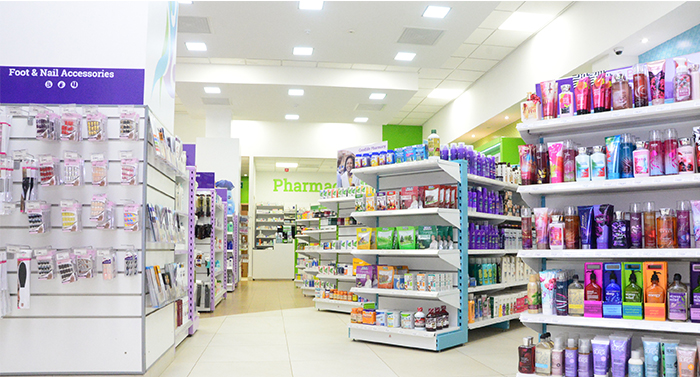
As life gets busier by the day, more and more Kenyans are embracing convenience shopping in their lifestyle changes as part of coping with the times. This means no longer having a trail of cars in traffic leading to giant super markets to make long queues, but rather picking up daily essentials in their neighborhood convenient stores on their way home.
At Goodlife Pharmacy, we have ensured that we keep up with this trend by strategically availing ourselves in the most convenient locations around the country and offering more services than your average pharmacy in many exciting and different ways. We have 60 branches and growing by the day to meet the demanding needs of Kenyans.
Goodlife seeks to be the leading Pharmacy, Health & Beauty Care provider in East Africa, delivering best in class care health advice, reasonably priced genuine medications, innovative pharmacy professional services and quality health & beauty products to all our customers.
Here are our top five picks why you should pop into a Goodlife outlet near you:
1.Shopping at Goodlife Has Never Been easier
We deliver to your door step, use our What’s App service by dialing 0715 703 000 and for home shopping our easy to browse website allows you to buy online anytime anywhere
2.We Are More Than a Pharmacy
Goodlife Pharmacy is much more than your ordinary every day pharmacy. With the new three-prong offering of Pharmacare, Personal Care and Beauty Products, you can now pop into any Goodlife outlet for more than just a prescription. We also offer free professional services like :-
- Skin Care Consultation,
- Nutritionist,
- Ear Piercing,
- Blood Pressure monitoring
- Blood Sugar Monitoring
- Body Mass index
- Wellness 360 Advisory services
- Dial Daktari services which is an on- call doctor services in Partnership with Valentis Health
- Affordable eye care by Essilor through their My Vision shop,
- laboratory services in Partnership with Pathologists Lancet Kenya (PLK)
3. Daily essentials are stocked
Long gone are the days when you had to pop into a mall or big shopping outlet to get basic daily essentials like diapers, wipes, baby formula, Vitamins, tissue paper and many others. You can walk into into any of our 60 outlets and get you choice of a variety of daily essentials hassle free. We also boast renowned international brands such Dr. Organics, La Roche Posay, Shea Moisture, Vichy, Aveeno as well as other local brands now grace the shelves at all our outlets to allow you easy access to your favorite hair and beauty products.
4. Professional Staff and Much More
Value addition is weaved right into every Goodlife Pharmacy outlet. You can get advice on what to use on your skin type, get an over the phone consultation with a doctor or get advice on your prescription from our pharmacists depending on the location, all this to ensure you have that much needed peace of mind. The staff at all Goodlife outlets are highly trained and highly skilled to ensure they offer the required assistance you need as you do your shopping.
5. Convenient Shopping Hours
Last but not least, Goodlife keeps convenient shopping hours in most outlets – especially since the traditional 6:00 P.M closing time for most chemists can be an inconvenience since most working-class citizens are either sitting in traffic at that time or still in the office. You can pop in to some outlets as late as 10:00pm and some even at midnight to quickly pick up your required items. Please check our store locator to see the opening and closing hours of the different outlets for your convenience.
So there you have it. Our top five picks of why you should pop into your favorite Goodlife outlet to do your shopping. Of course, there are many more reasons – especially the promotions and the wide range of gift items to gift that special someone – but that is a story for another day.
Webinar: Building a Strong Immunity
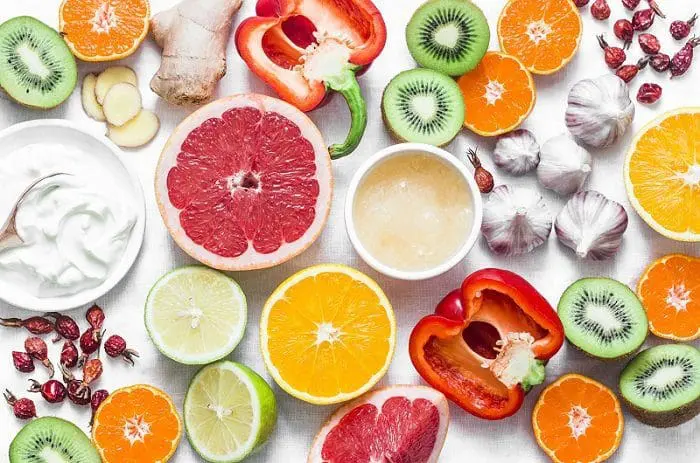
A healthy mind and intelligent mindset is of utmost importance to build a healthy body. Proper knowledge is key and foremost in understanding of how immunity works from within. Join our FREE webinar on nutrition and immunity in extraordinary times with Health and Lifestyle Consultant, Rama Manikumar on November 6th at 2pm to 3pm.
Are you immune-efficient?
- If you can measure your immunity today, what would the meter look like?
- How ‘much’ of ‘what’ would it take to improve your immune system?
- Working with your body requires intelligence and deep awareness – do you have it in you?
Food is fuel for both your body and mind. Macro and Micro nutrients are essential in order to prevent many diseases. You can use nutrients from food wisely to protect, build and strengthen your body. If what you eat alone is not balances, find out how you can include nutrients to assist.
Why is vegetarianism gaining popularity? What is in the Plant Based Nutrition? Find out how and why it can assist in shaping up many arenas of health including immunity.
What supplements do you take? How do they help you to fight against infections? How sure can you be that you are taking the right ones and in right recommended amounts? These matter most, and you can find out more in this space.
Have you been on a roll of antibiotics? Has it upset your stomach and gut? You are not alone, and we understand this. You can help heal and repair your gut. After all, your gut contributes to about 70% of your immunity. Learn about your microbiome efficiency.
Every one of us is endowed with innate abilities to fight disease at onset, if we hone the skill of understanding. Do not miss this webinar!
Blemish Skin: Night Time Routine

Night-time is when your body rests, renews and recharges itself, and your skin is no exception. A good night-time skincare routine will help give your skin what it needs to do this – and by sticking to that routine night after night, you achieve for comfortable, healthy-looking skin day after day.
Night time is also an ideal time to use a targeted treatment, as it can get to work while you sleep, and won’t be rubbed away by daytime activities or makeup application.
Step 1: Make-up Removal
Blemish-prone skin needs a specific type of care. You need a routine that will balance thorough cleansing and unclogging pores with the right amount of hydration, along with soothing to target any blemishes and prevent further aggravation. This will leave your delicate skin feeling soothed.
If you wear makeup during the day, your first job is to make sure it’s all removed, especially from the lips and delicate eye area. Choose a product specifically designed as a makeup remover, as this will take off even heavy makeup easily, without the need for extra rubbing and stressing your skin. Its pretty simple apply make up remover to lids, lashes and lips using a cotton wool pad, then gently sweep away, leaving the skin clean.
Step 2: Cleansing and exfoliating
Blemish-prone skin often goes hand in hand with oiliness. If your skin produces a lot of sebum, your cleansing step will need to be highly effective so that the surface of your skin is clean, fresh and soft, with nothing to clog up the pores.
To keep blemish-prone skin smooth and looking clear, you might want to add exfoliation on top of cleansing. Exfoliation helps to keep the top layer of your skin smooth and fresh by targeting the older layers that can outstay their welcome on the skin’s surface, potentially clogging the pores.
You may want to choose a product that combines cleansing with gentle exfoliation, for example, Normaderm 3 in 1 cleanser. It combines cleansing, exfoliation and mattifying in one product.
Step 3: Toning and purifying
To enhance the sebum-removing effect of your cleanser, freshen the skin and remove any last traces of oil or makeup, you may want to use a toner. This step can add benefits like exfoliation, mattifying or anti-bacterial action, depending on the formula you choose. It’s also a good choice if you use a cream cleanser, as it will remove any last traces of cleanser that your cotton pad may have left behind.
Step 4: Targeted care
If you currently have blemishes you can focus care on a particular area with a targeted or on-the-spot treatment. These are highly-concentrated products that you use in small quantities directly on blemished areas. They can help to target blemishes with a drying effect, soothe the feel of skin and reduce the appearance of any existing problem areas. Some products combine soothing, blemish-fighting and protection in one. These types of product are best applied to clean skin so they can work directly on the affected area. application.
Step 5: Moisture
As with any night-time routine, the final step is to moisturize your skin. Even oily and blemish-prone skins need good hydration, especially if you use a powerful cleanser and exfoliate that removes a lot of sebum. If your skin has been left soft and smooth by cleansing and exfoliation, you need moisturize to keep it that way.
However, you do need to choose your moisturizer with care. Look for non-comedogenic formulas that are designed not to clog pores, and avoid anything that feels too oily or rich. Many night creams have a richer texture than day creams, so you need to be extra-selective when choosing one for oily or blemish-prone skin.
Normaderm Night is a night cream designed for blemish-prone skin. Overnight, it targets excess sebum production and helps the skin feel clean and purified, reducing the appearance of pores and blemishes.
Webinar: Nutrition in Managing Diabetes and Blood Pressure

During these unprecedented times, it is vital that good health it at the top of your hierarchy of needs. At the wake of the COVID-19 pandemic, learning to manage underlying conditions such as diabetics and hypertension is very crucial. This is why Goodlife Pharmacy in partnership with Mega We Care Pharmaceuticals invite you to a webinar that will change how you look at your diet forever.
Mark your calendars for August 27th at 2:00 pm where American based Dr. Scott Stoll ,Co-Founder and Chairman Plantrician Project and Dr. Sant Chaiyodsilp, Chief Wellness Officer at Wellness We Care will review evidence in studies that show support of incorporating plant based diet into your lifestyle in reducing the risk and managing complications related to type 2 diabetes and high blood pressure.
Type 2 diabetes is a global epidemic, with approximately 422 million cases worldwide and a rapidly rising prevalence in middle and low-income countries. Studies show a positive correlation with diet and type 2 diabetes management.
JOIN THE WEBINAR HERE
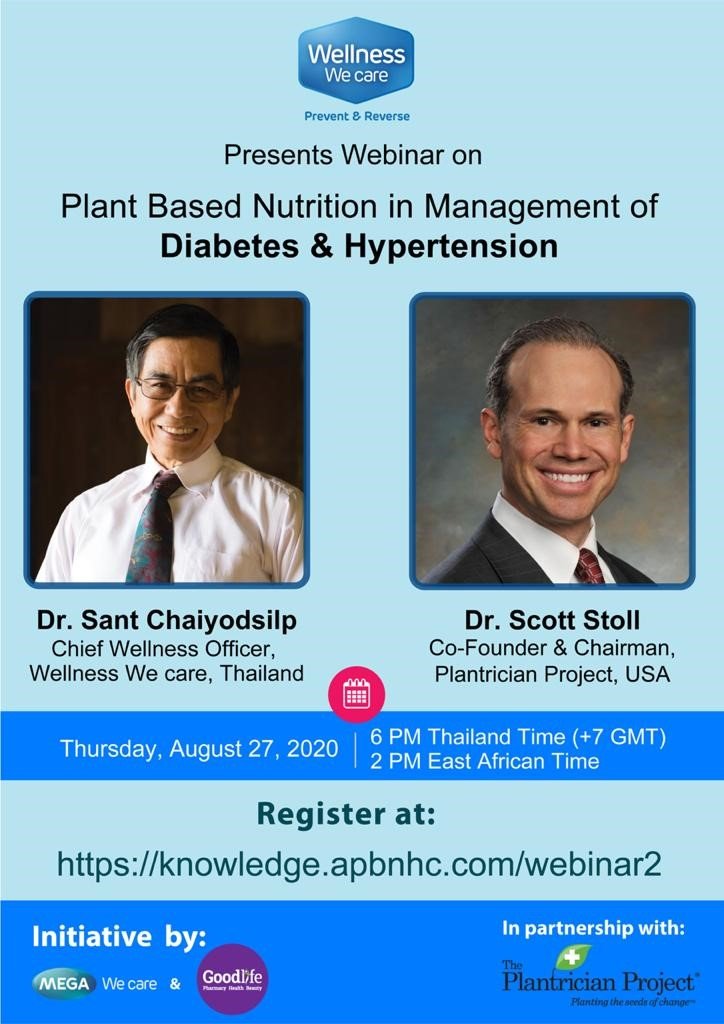
Hypertension also known as high blood pressure is identified as the number one risk factor worldwide for deaths and disability-adjusted life years. Worldwide, it is estimated that one billion people have hypertension. Various medical studies found that people on plant based diets had significantly lower systolic and diastolic blood pressure, and significantly lower odds of hypertension.
Register and join us for a live discussion on the findings of the role of your diet in learning how to manage your condition for optimum health. This webinar will help impart this knowledge through tried and tested ways by renowned experts in the field.
Treating Eczema
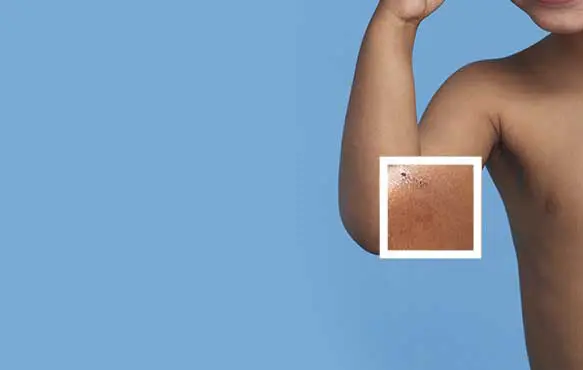
As there is no definitive eczema cure, the goal of eczema treatments are to manage symptoms of flare-ups and to relieve and prevent itching. Similar to what causes eczema, how to treat eczema can be different for everyone and for different types of eczema. Read more below on tips to manage eczema.
Eczema may require treatments and a maintenance routine to manage symptoms. Depending on the severity and type of eczema, your dermatologist will provide the most effective course of treatment. Common solutions for how to treat eczema include:
Bathing & Moisturizing
Eczema prone skin retains less moisture than normal skin, often resulting in dryness. To give the skin the moisture it needs, a combination of bathing and moisturizing may be used1 . It is recommended to soak skin in lukewarm water for no more than 10 minutes. After dabbing skin dry with a towel, apply a body moisturizer to lock in moisture. A great way to tell which moisturizers and cleansers are appropriate is to check the National Eczema Association website for a list of qualified products. The Lipikar line of body lotions has been accepted by the National Eczema Association after a thorough review of their ingredients, safety, and efficacy. These body lotions for dry skin and eczema are suitable for the whole family including babies even as young as 2 weeks.
Corticosteroids for Eczema Treatment
Your dermatologist may prescribe topical corticosteroid creams to be applied to the affected areas. Corticosteroid creams are a common eczema treatment that have anti-inflammatory properties. For less severe cases, over-the-counter hydrocortisone creams may be used to help soothe skin and reduce damage from scratching. For the most severe cases, oral or injectable corticosteroids may be administered. These are only recommended for short-term use due to possible side effects.
Wet Wrap Therapy
During severe flare-ups, wet therapy can be used to hydrate and soothe skin. This treatment can be done at home after bathing and moisturizing or medicating. It involves applying damp gauze or clothing to the affected area.
Light Therapy for Eczema Treatment
If medications do not work for you, there is some evidence to support the use of light therapy, or phototherapy. This involves exposing the skin to a controlled amount of UVB rays to help calm inflammation and increase levels of vitamin D. This treatment should be administered by a health care professional.
Immunosuppressants
While there is no definitive cause to eczema, it has been linked to an immune system that overacts to certain irritants. Often prescribed for severe eczema that does not respond to topical treatments, immuno-suppressants work by lowering the body’s immune system response. Due to potential side effects, this eczema treatment is typically administered for a short period of time.
What is Eczema?

WHAT IS ECZEMA?
Eczema is an umbrella term for different types skin conditions characterized by itching and rash. The most severe, common and long-lasting type of eczema is called atopic dermatitis (AD).
WHAT ARE THE SYMPTOMS OF ECZEMA?
Eczema nearly always begins early in life — 90% of cases occur before the age of five. Itching and rash most often appear inside the elbows, behind the knees, and on the face, but can affect almost any part of the body.
People with eczema always have very dry skin. The rash and itching will be intensified during ‘flare-ups’ which will be alternated with relatively symptom-free periods.
ECZEMA AFFECTS 1 IN 10 CHILDREN, but can affect people of all ages more than half of the kids who have eczema today will be over it by the time they’re teenagers.
La Roche Team of Researchers
more than half of the kids who have eczema today will be over it by the time they’re teenagers.
HOW TO MANAGE ECZEMA AT HOME
1. Don’t scratch your eczema
While scratching can temporarily relieve the itchiness associated with eczema, it only makes things worse. Your nails can damage the protective skin barrier, which maintains moisture levels in the skin and protects it against irritants. Telling your child to stop scratching rarely works so dermatologists often recommend keeping their finger nails trimmed short and covering itchy areas with loose fitting, cotton clothing.
2. Wear cotton
Avoid scratchy fabrics such as wool. Instead opt for breathable cotton, which is softer on the skin.
3. Opt for lukewarm showers
Take lukewarm showers and limit them to 10 minutes max. After gently patting your skin with a towel, apply your topical medication or moisturizer to the affected area. Moisturizing after showering helps lock in moisture. When it comes to your choice of moisturizer, look for formulas such as Lipikar Balm AP+, which is accepted and recognized by the National Eczema Association to be suitable for the care of eczema.
4. Avoid sweating when possible
Working out is not off-limits, but it is recommended to shower immediately afterward. Also, opt for looser-fitting, breathable clothing that wicks sweat away from the skin. If you’re experiencing a flare-up, it’s best to opt for low impact workouts with less carious such as yoga or strength training to minimize sweating.
5. Avoid harsh soaps
When cleansing or bathing, avoid harsh soaps, as these may further strip skin of natural moisturizing factors. Use gentle, fragrance free cleansers instead.
6. Control your environment
Allergens such as dust mites may trigger eczema in some cases. Be sure to vacuum and air rooms out regularly to prevent accumulation. If the air in your home is particularly dry, look into purchasing a humidifier.
Consult your dermatologist for more advice on how to treat eczema and to determine which eczema treatment is best for you.
Talk about it with your doctor or dermatologist. Topical corticosteroids, also called cortisone or steroid creams, are commonly used to treat eczema. Other prescription treatments your doctor may recommend include: antihistamines (to help control itching) oral or topical antibiotics (to prevent or treat secondary infections, which are common in kids with eczema).
Find the Lipikar Products HERE
Goodlife: Free Advice on Lifestyle Diseases

NAIROBI, Kenya, Jul 30 – Kenyans are set to receive free advice on Non – Communicable Diseases (NCDs) or lifestyle diseases on all Goodlife Pharmacies across the country in a new campaign dubbed Wellness 360.
The campaign follows a partnership between Goodlife Pharmacy and Phillips Pharmaceutical where Goodlife pharmacy staff will get the continuous training on Non – Communicable Diseases (NCD’s), in a bid to equip Kenyans on lifestyle modification interventions so as to help in reducing the burden of NCD’s and promote healthy lifestyle.
The partnership is under Philips Top100 training programme that seeks to provide patient centric education aimed increasing knowledge of NCD’s to Kenyans.
Under the collaboration, various experts from Clinical Nutritionist, Medical Experts and Consultant pharmacists will provide continuous training and update tailored on patient- centricity and advice on wellness and lifestyle modification.
Phillips Pharmaceutical CEO Newton Siele
The move comes even Covid-19 pandemic worsens with people who suffer from NCDs at a great risk.
Ministry of Health data shows that NCD’s accounted for over 50 percent of hospital admissions in Kenya. Moreover, 33 percent of Covid-19 related deaths suffered from diabetes and hypertension. Latest statistics from the World Health Organization (WHO) also indicate that about a quarter of Kenyan Women aged 15 years and above are either underweight or obese.
In contrast only 7 percent of Men in the same age group suffer from the conditions with obesity increasing across at an alarming rate.

Lifestyle modification is highly recommended as one of the interventions in reducing NCDs related complications, Kenyans can now walk in any of our pharmacies and get necessary advice especially on nutrition and healthy living.
Goodlife CEO Amaan Khalfan
The campaign will run for 5 months.
About Goodlife Pharmacy
Goodlife Pharmacy is a fast-growing pharmacy and health hub and only one of its kind in East Africa. The company provides trusted pharmaceuticals to customers across the population from convenient locations – with a total reach of over 3 million people with 65 branches in the region. Goodlife offers a range health services including Blood Pressure, Blood Glucose, Body Mass Index, Malaria and Family Nutrition. Doctor Consultations, Vaccinations and Laboratory Services are available in select locations. Goodlife also offers delivery services for its range of products available on its recently launched e- commerce website goodlife.co.ke.
About Phillips Pharmaceuticals Limited
Phillips Pharmaceuticals limited is one of the pioneers Kenyan Pharmaceutical Distribution Company focused on Pharmaceuticals, Medical devices and Over the Counter medicines. Established in 1991, Phillips Pharmaceuticals has been at the forefront in providing essential pharmaceuticals, medical devices and OTC drugs to healthcare professionals focused on helping the patients’ needs.
Get Your Vaccinations Today!

Goodlife Pharmacy currently has 65 store outlets throughout Kenya. We are providing this year’s Influenza, Cholera and Pneumonia vaccines in select stores and we urge you to bring your children and your loved ones . The vaccine will be administered by a professional nurse. Here is more information about the vaccines we offer.
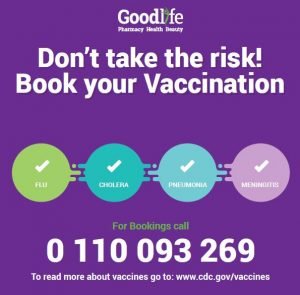
PNEUMONIA VACCINE
What is Prevnar 13 vaccine (Pneumonia Vaccine)?
This is a pneumococcal conjugate vaccine to protect against 13 types of Streptococcus pneumoniae bacteria that most commonly cause serious infections in children and adult.
What is Pneumococcal disease?
This is an infection caused by Streptococcus bacteria that depending on the areas infected can cause
- Bacterial Meningitis.
- Pneumonia, an infection of the lungs causing cough, fever and difficulty in breathing
- Otitis Media
- Sinus infection.
- Bacteraemia, a serious infection of the bloodstream
Who is should receive Prevnar 13?
- The recommendation is for children below 2years and adults above 65 years.
- Patients with pre-existing conditions.
- Adults 19 years – 64 years who smoke cigarettes.
Vaccine schedule: –
Preferred sites are anterolateral aspect of thigh in infant and deltoid muscle of upper arm in older children or adults
FLU VACCINE
What is a Flu shot/vaccine? :-
An influenza shot is a vaccine given by needle usually in the arm to protect against four influenza viruses research has shown to be most common during the season (June – November)
Who is at risk? :-
Everyone is susceptible to an infection so can be vaccinated but special emphasis is on expectant mothers, the aged, patients with chronic conditions and children above six months.
People who shouldn’t get a flu shot: –
Children below 6 months and patients with severe allergies to the vaccine or any ingredient in the vaccine.
Why get vaccinated: –
- Prevents people from getting flu.
- 600,000 deaths are caused by influenza each year.
- Severe influenza will lead to hospital admissions.
- Vaccinations helps protect people with chronic conditions and pregnant women.
- Flu vaccine can be lifesaving to children.
CHOLERA VACCINE
Who is at risk?
Cholera affects both adults and children and can kill within a few hours if left untreated.
Prevention?
Oral Cholera vaccines.
- Should be used with proper sanitation and hygiene.
- The vaccine can be given to anyone above one year of age.
- Two doses should be given orally two weeks apart.
MENINGITIS VACCINE
CDC recommends meningococcal vaccination for all preteens and teens. In certain situations, CDC also recommends other children and adults get meningococcal vaccines.
CDC recommends a Menengitis vaccine for adults if they:
- Have a rare type of immune disorder called complement component deficiency
- Are taking a type of medicine called a complement inhibitor (for example, Soliris® or Ultomiris®)
- Have a damaged spleen or their spleen has been removed
- Are a microbiologist who is routinely exposed to Neisseria meningitidis
- Are part of a population identified to be at increased risk because of a serogroup B meningococcal disease outbreak



